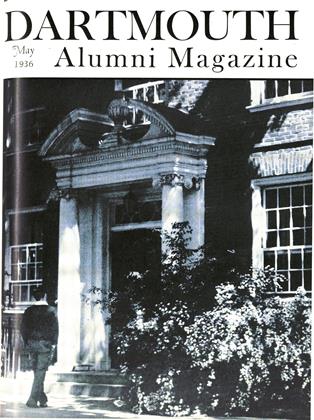SPRING OF 1936. A good looking, well bal- anced, more than moderately intelli- gent youngster is getting ready to fulfill his lifetime ambition—admission to Dart- mouth College. "The trouble is," he tells you, "they insist on knowing why you want to get in." You are taken aback. "That ought to be easy enough," you say. "Think of all the reasons, put them on a piece of paper, and send them along up to Han- over." "But that's just it," he comes back at you. "Tell me some really good reasons, because I can't think of any myself."
You are horribly aware, all of a sudden, that this must be a sample of the lost generation you have read so much about. Good Lord, no reasons! Why, twenty years ago—Well, what about twenty years ago? Come to think of it, there wasn't any selective system. You simply sent the authorities a list of commendable high school grades, along with a neatly inscribed notebook of experiments in physics, and there you were: admitted on "certificate." Then came a batch of enticing diagrams of rooms available in New Hamp and Wheeler, Middle Mass and Fayerweather. You marked crosses on two or three, sent them back with a swelling consciousness of maturity, and felt that your future was a settled affair.
All the same, in case you had been asked, of course you could have come promptly to bat with a logical array of "hences" and "therefores." To begin with, surely there must have been an overmastering desire for a liberal education. Culture—you sought culture, no doubt. All right, enough for a starter. But when the gates swung open, just how did you carry out your pursuit of the elusive goddess? You studied reasonably hard; you went to a great many classes; but, to be perfectly honest about it, the all-important objective was a certain mystic decimal fraction (was it called three point two?). Once you attained that, you had unlimited cuts; you needn't go to nearly as many classes, and you need only study hard enough to acquire the unlimited cuts all over again.
Our reminiscence may be tending toward the morbid. After all, we remind ourselves, book learning is never the beall and the end-all. How about winter sports? Don't the statistics show that hundreds of boys go to Dartmouth for the sheer joy of battle with ice and snow? More power to them if they do. But we recall, in some embarrassment, that skiing too openly and too often was considered a trifle "wet" in our own unregenerate day.
You begin to feel a bit more in sympathy with the bewildered aspirant to membership in the class of 1940. Perhaps if you could tell him what it would all amount to in the end, you might be hitting upon the intangible somethings which he so unwittingly desires. How can you know what you want at seventeen or eighteen? Strong friendships, good health, freedom to be yourself, normal growth from adolescence to manhood. You are only glad afterward that the opportunities were there, that they were fuller in realization than you could have anticipated. Even now, can you name them in concrete terms? Paddling across the campus through springtime slush to answer the summons of chapel bells. Strangely jumbled personalities adjusting themselves and warming to each other in the crazy, brawling confusion of a fraternity house. Two pianos—Breg and Sal—sending gorgeous harmony out over the graveyard in back of the Beta House and up through the open windows of Massachusetts Row. The burning of freshman caps and running of the endless gauntlet at Wet-Down. Carving senior canes, sitting in the sunlight and shadow of the Senior Fence. Solemnly breaking a clay pipe on the battered stump of the Old Pine.
 View Full Issue
View Full Issue
More From This Issue
-
 Article
ArticleFRATERNITY REPORT SUBMITTED
May 1936 -
 Class Notes
Class NotesClass of 1902
May 1936 By Hermon W. Farwell -
 Article
ArticleGRADUS AD PARNASSUM
May 1936 -
 Class Notes
Class NotesClass of 1911
May 1936 By Prof. Nathaniel G. Burleigh -
 Class Notes
Class NotesClass of 1929
May 1936 By F. William Andres -
 Class Notes
Class NotesClass of 1930
May 1936 By Albert I. Dickerson
Article
-
 Article
ArticleAegis Discontinued
April 1933 -
 Article
ArticleTentative Program for Commencement, 1933
June 1933 -
 Article
ArticleNew Fellowship Named for Class of 1926
November 1935 -
 Article
ArticlePublic Affairs Conference
MARCH 1970 -
 Article
ArticleGRADUATE INSTRUCTION IN DARTMOUTH COLLEGE
January 1916 By Ashley Kingsley Hardy '94 -
 Article
ArticleTall Man High Average
June 1993 By Robert H. Nutt '49

